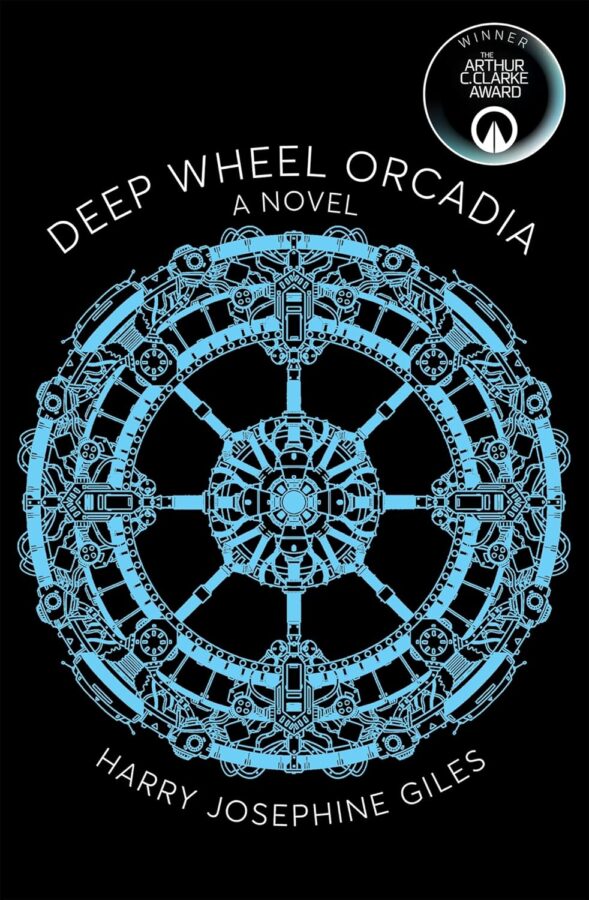Now I know a lot of our readers LOVE poetry so when J. Comer offered a review of the sci-fi poetry Deep Wheel Orcadia by Harry Josephine Giles, I was excited to see what he had to say.

Got Wheels?
Deep Wheel Orcadia by Harry Josephine Giles
reviewed by J. Comer
This is a book of poems telling a connected, novelistic tale about a space station built and inhabited by Scots people which orbits a gas giant world. It is written in Orcadian dialect admixed with English, with a translation (of Scots, a Germanic language distinct from Gaelic.) into English at the bottom of each page. Since this is not exactly normal fare (a charming reading is at https:// www.youtube.com/watch?v=E1mWa_ltX5o), perhaps, for Cirsova readers, allow me to explain.
One passage reads:
Astrid Shaas Darling Her Wark
“It’s beautiful,” says Darling. “Bonny,” sheu says
cooriean in, giean a smuthick, no seean
the artist’s teum leuk. “The yellows and greens,
the way you’ve caught the planetary winds.
How small the station seems in the corner. So much
feeling.” Astrid canno spaek. Sheu spaeks.
“A’m no feelin hid.” Darling laaghs.
“You might not know it but I think you are,
somewhere. Honestly, this is fantastic.” The artist
wheenks an graabs her claes, waantan layers
atween her spacer skin an Darling’s scunneran
enthusiam. “Thoo disna unnerstan”
This translates to:
Astrid showpasses Darling her work. “It’s beautiful,”
said Darling. “Finepretty,” she says,
snugglenestleholding close, giving Astrid a
kisscaresscuddle, missing Astrid’s emptyhungry look. “The
yellows and greens, the way you’ve caught the planetary
winds. How small the station seems in the corner. So much
feeling.”
Astrid can’t speak. She speaks, “I don’t feel it.”
Darling laughs. “You might not know it, but I think you
are, somewhere. This is fantastic.”
The artist shrugtwitchflounces off and grabs her
clothes, wantneeding between her spacer skin and Darling’s
sickspoiledboring enthusiasm. “You don’t understand.”Darling laughs. “You might not know it, but I think you
are, somewhere. This is fantastic.”
The artist shrugtwitchflounces off and grabs her
clothes, wantneeding between her spacer skin and Darling’s
sickspoiledboring enthusiasm. “You don’t understand.”
As you can see, the translation includes compounds and neologisms to mirror the ambiguity of some Orcadian words. This reviewer found that reading the Scots aloud made his understanding greater. (The passage above contains more standard English than is usual in this book.) The plot concerns an artist (Astrid) coming home from Mars, to work on her arts, on finding romance with Darling, and on the mysterious Lights, signs from…others, and on the life of the people aboard the Wheel. As in C.J. Cherryh’s Alliance/Union stories, stations are made obsolete and deteriorate, and technologies change. As is true of Orkney itself, the
station may become a backwater.
Deep Wheel Orcadia is a fine book. The plot is fairly simple, but the great strange beauty of the languages in which it is delivered is such that it makes us realize that SF is inherently poetic. It simply takes the prose craftsmanship of Ray Bradbury or Gene Wolfe to realize this. The setting is another rarity. Only Cherryh has so recognized the importance of stations over planets in human expansion into space.
All in all: Recommended. Look at it, read it, maybe aloud, and let it speak to you; it’s not for everyone.
